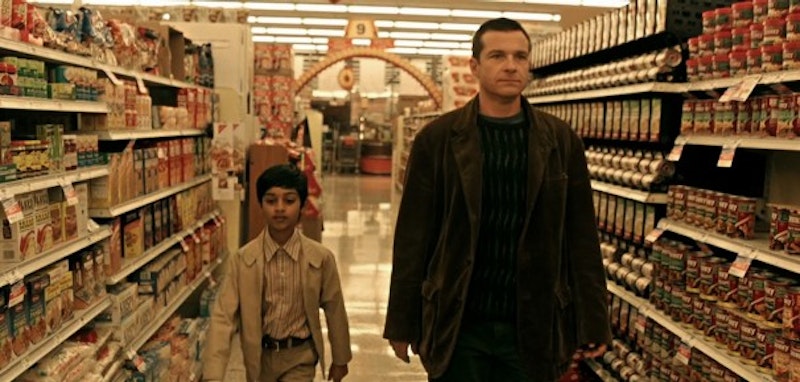Jason Bateman will always be Michael Bluth. The leading role on Arrested Development saved his career critically and eventually commercially after a decade of drinking and drifting. He was sitting pretty on all the money he made as a kid on Little House on the Prairie, Silver Spoons, and The Hogan Family, so, by his own admission, he took it easy through most of the 1990s, preferring partying and casual sex over work he didn’t need. Because he’d generated a lot of cash as a kid, he always figured he’d be able to “re-generate” once he ran out, which makes him look like a genius because it’s pretty much what happened. Even though Arrested Development was under-watched when Fox mishandled it, it effectively launched or re-invigorated the careers of everyone involved. Michael Bluth, the hapless, frustrated, faceless, and misunderstood straight man who no one seems to remember or consider is Bateman’s signature role. I’m sure he’s happy his millstone is a well-respected show that was ahead of its time and eventually got its due, rather than being Bob Saget, whose persona in the cultural consciousness of those who remember the hugely successful Full House is the complete opposite of his actual sensibilities as a comedian.
Again, do they care? Doubtful. But Bateman is clearly eager to stretch his legs and make up for lost time by working as much as possible, wrapping the revival of Arrested Development on a Friday and beginning production on his directorial debut Bad Words that Monday. Although Bateman didn’t write Bad Words (by Andrew Dodge, it was among the top of the Hollywood Blacklist—the most talked about un-produced screenplays floating around), his decision to play such an absurdly rude character in his first film as a director feels like an exhalation rather than a rebellion or a rejection. Happily married and of means, he has nothing to lose and nothing to prove, knowing how hard it will be to make anything as memorable or impactful as Arrested Development. Bateman is simply having fun, and most of the time it’s great. Bad Words sits comfortably alongside Bad Santa and Bad Teacher, popular black comedies with major actors playing comically cruel anti-heroes that spend their time scheming insulting others to their face completely deadpan, unfazed. They are unrepentantly mean and rude and nasty and constantly attacking a world that makes no sense at all. Here, it’s clear from the beginning that some childhood trauma is what drives Bateman’s character, Guy Trilby, to exploit a loophole in the Golden Quill National Spelling Bee’s rules that allow him to participate in a kids’ competition because he never finished middle school.
As with the other Bad’s, this is a simple plot written with room for the asshole to verbally abuse people. Bad Words is an excuse to be mean to people to their face, even if they don’t deserve it, which is something all of us feels at one point, irrational anger and the instinct to hurt or harm others for no particular reason. This is an ugly fact that’s seldom explored in popular comedy. Bad Words is anti-sentimental, a joyous celebration of odious manners and the rush of insulting someone to their face, the pleasure in making others’ uncomfortable, even miserable. It’s a sociopathic drive that exists in all of us, whether we choose to recognize it or not. If you don’t, you probably hate movies like this because the people in them disgust you; their flagrant, unfiltered disrespect and cold calculation is repulsive. But it’s simply naive to pretend that these traits don’t exist in all of us, and Bad Words wallows in it. The poster tagline: “The end justifies the mean.” I group these three Bad movies together because they all reject a saccharine, redemptive worldview thoughtlessly embraced by most media, where the hero must be sympathetic and good, and if not, he must learn in the end. It’s an idealized and overused way of telling a story and depicting the world, and whenever a movie as bleak as this comes around, it’s something different and true and real.
Bad Words falters only in its often sophomoric writing. Yeah, okay, duh, right? Meanness for its own sake is pretty childlike, yeah? No, I mean the unfunny racial jokes. Maybe it’s just on my mind because of #CancelColbert, Twitter’s latest outrage, but the running jokes related to Bateman’s 10-year-old Indian sidekick, Chaitanya Chopra, are simply stupid, and they dilute and dumb down a movie that really didn’t need it. “Stuff it in your curry hole,” “Hey Slumdog,” customer service jokes, it’s just cringeworthy and bad, of no comedic value, and actually reinforces the script’s notion that the world is a cruel and ignorant place, because even the screenwriter couldn’t get it right.
There’s a difference between insulting someone and hitting their weak points because of their own self-righteous, hypocritical, or helplessly rigid behavior, and using tired and cartoonish racial stereotypes that only a hack would keep in the final draft. Even though the kid bashes Bateman over the head with a metal folding chair at the film’s end after another dumb Indian joke, screaming “I.... was born... in CLEVELAND!" these mindless ciphers of “jokes” were featured prominently in the advertising, as they are in many movies. That’s probably more a testament to how simple and brainless most people are than Bateman’s own tastelessness, because this is a very assured and tightly made movie for a first-time director. Bad Words is fearless yet responsible, even though it sometimes veers into the dark territory of humanity it’s aiming at.
—Follow Nicky Smith on Twitter: @MUGGER1992

